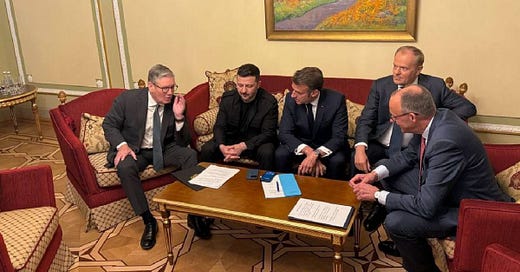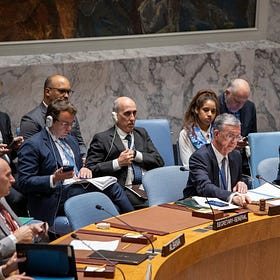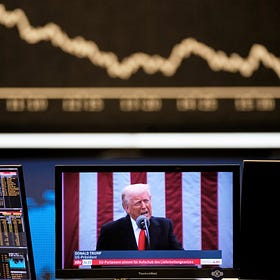Temporary Name: The Post-Post-Cold War Era
Welcome to the age of apathy, turbulence, and personalities
Over a year ago, I wrote a long piece about how the world is turning into a warm war. Now, with the hindsight of Trump’s victory in the 2024 election and the chaos that has happened since, we are at a transitional stage that follows the Post-Cold War era (Temporary title, subject to change in the future), and whatever comes out of it is anyone’s guess.
We don’t know the precise year when the post-Post-Cold War era started. Some say it started in January 20, 2025, the day Trump was inaugurated for a second time. Since then, Trump has embarked on a tumultuous domestic and international campaign to shake up the world in his image. As the US President told the Atlantic magazine, “I Run the Country and the World.” If you need a primer on how Trump has reshaped the global order, as noted in the article below last month.
We're All In The Blast Zone
Believe it or not, Donald Trump was the person who got me interested in politics. Like many political observers outside the United States, the Trump presidency between 2017 to 2020 was a weird, chaotic spectacle. Sure, it was alarming to see the President of the United States enact worrying le…
At the same time, there are several alternative dates to mark the beginning of the post-Post-Cold War era. One date could be March 11, 2020, the day when COVID-19 was declared a pandemic by the WHO, reshaping how people see themselves in society and treat others in the real world. Another date could be June 23, 2016, when the UK narrowly voted to leave the European Union, kicking off the decade in populism and nativist outrage.
Regardless of when it started, the transitional period has deeply affected how individuals perceive politics, how people with power view their relationship with the world, and how local events can generate huge ramifications with the rest of the world.
Uncertainty is a great theme that has loomed over the world post-Post-Cold War era. Every day, we wake up to new horrors, new surprises, and new ways the world plays cruel jokes on the rest of us. There are moments when self-doubt asks whether you are the crazy one, and there are moments where brief respite is only created because the other side does something incompetent or utterly mad that it beggars belief.
Even though we can’t have a definitive name to define the post-Post-Cold War era just yet, I know there are three features that will be inextrably linked to this age, and will be needed together to piece out the true name of this extraordinary time.
For voters, this is the age of apathy. Voters are always unpredictable beasts in democracies, but recent years have changed that to the extreme. In a weird logical paradox, people have become more tuned in to politics than they have for generations, but they have learned less than nothing from it. Thanks to information bubbles and echo chambers, people can subscribe to realities that they can ignore whenever it doesn’t fit their worldview. After important international events like COVID, instead of remembering the hard times and learning the lessons from it, people memory hole it and pretend it never happened. Societies seem to be apathetic about the world around them, believing nothing that happens in the news could hurt their interests or deserve their short attention spans.
Everyone is always outraged, but always at skin level. Most damning of all, people can be deliberately cruel to others just because it gives them satisfaction. Owning the libs is a great trend among conservatives these days, precisely because hurting the other side provides an adrenaline rush and emotional satisfaction that nothing else can replicate, even if the same actions hurt them as well.
What that leads to is exploitative accountability. People can say a more successful presidency is a failure because it did not do 100% of the things they like, people can hyperfixate on a single issue unless it happened to that one politician or party candidate, people can override domestic politics over international relations because it directly impacts them more, and people will support policies that are rooted in selfishness than selflessness while harming their interests. Of course, these can all be exploited by politicians in their campaigns and gain votes. However, even if voters don’t care about global politics, global politics cares about them a whole lot more. Just ask how supply chains and tariffs are currently doing to inflation.
For the political scene, it is an age of turbulence. Even as voters and politicians want to focus more on themselves and domestic politics, international relations has the tendency to force people to look up. Globalization has been active in politics and economics since the Cold War ended. As countries try to detach themselves from the intricate web, everyone is now realizing how hard it is to decouple from the rest of the world. Another key thing about globalization is the ripple effect, one sudden tariff declaration here, a global market panic there, then leading to awkward concessions while trying to declare you have won.
It is not just the international political economy where everything’s in flux, the global order is now non-existant. Political scientist and pundit Ian Bremmer coined the term “G-Zero,” where no one country (or constellation of countries) is willing or able to assume the responsibility of global leadership. As we have seen since January 20, the global leadership vacuum is emptier than ever, and it sucks. In many European countries, people are treating NATO as effectively dead. In Gaza, Ukraine, Sudan, and many non-war zone places around the world, international law is broken with impunity. As global conflicts are a dime a dozen these days, all of them have regional and international ramifications that transcend culture and identity.
In this multipolar world, it is hard to see where the heads are and where the authority lies. The United States has signed off from being the leader of the free world, and has relegated itself to be the planet’s official dealmaker with benefits. China wants to jockey for the top spot, but internal and external troubles have distracted it from taking the crown. Russia is bogged down in Ukraine in terms of its military, yet it still plays a shameful stunt that shifts the goalposts for peace talks every single time. The European Union could barely hold itself together, while the UK is still managing its steady decline. Global South countries can pretend they are in charge, in the same way Maggie Simpson is driving the family car with her toy set.
Most importantly, for leaders, it is the age of personality. Politicans get elected into office not because of their ideas or substance, but thanks to their presentation. The prime example is, of course, Donald Trump. Regardless of what you think of him, he possesses the ability to present himself as a man of the people, and one that resonates with the emotions of many of his supporters. The enduring popularity of Trump, despite being a billionaire and a convicted felon, will undoubtedly be a subject of profound study for political scientists and psychologists in the years to come. In office, Trump’s brainwaves and whims seem to dictate policy. Continuing a tradition from his first term in office, Trump likes to post midnight rants about everything from the “radical left” to bashing Joe Biden’s presidency. Speaking of Joe Biden, despite his policy accomplishments, his presentation as a weak old man has played a huge role in turning voters against the then-president. More broadly, populist and far-right leaders like Nigel Farage and Javier Milei have amplified their personalities in their pursuit of power, while gaining many domestic and foreign supporters along the way.
It seemed many voters want a fighter, not a policy wonk who knows their stuff. That is assumed rhetoric used by populists and authoritarian wannabes in their pursuit of power, but that works the same for opposition figures as well. Bernie Sanders and Alexandria Ocasio-Cortez have seen a boost in their popularity thanks to the “Fight Oligarchy” tour, and many see AOC as a future leader of the Democratic Party thanks to her vocal advocacy. At the same time, politicians like Jasmine Crockett are viral on social media thanks to her quick jabs at Trump and fellow Republicans.
Moreover, personality just works in a political formula. Some of the top contenders in the Democratic side include Stephen A. Smith and Jon Stewart. Smith is currently a sports commentator who has recently dipped his toes into politics, and is beloved by his fans for his sharp wit and spicy takes. Another contender that many say could be a potential 2028 candidate is Jon Stewart, the comedian who is famous as the host of the Daily Show and his takedowns of both Republicans and Democrats alike. This comes on top of the popularity of Trump as a reality TV show host, and right-wing figures such as Joe Rogan and Charlie Kirk resonating their message with young (and mostly male) audiences. In modern politics, being an outsider is an asset, while resonating in the manosphere and specific social circles could be a huge boost to your political capital.
In international relations, personalities now drive the agenda. Setting our sights away from US politics, Canada’s Mark Carney has won his election by positioning himself as the fix-it man against Trump’s threats, China’s Xi Jinping has everyone’s attention after not bending to Trump in his tariff war, Russia’s Vladimir Putin is continuing to play his will-he-won’t-he game with ceasefire talks, Ukraine’s Volodymyr Zelensky continues his transformation from a comedian to national war hero after more than three years of deadly war, Israel’s Benjamin Netanyahu’s insistence in turning the Gaza war into an occupation will continue to ignite regional tensions…
All of that marks the weird transitional period we’re living in, but that transition has to lead to something. Worst case scenario, all the things we are seeing will lead to a power keg that ignites into a broader war. Best case scenario, the global public will learn from the error of our ways, and work to build a better society. The name for the post-Post-Cold War era is yet to be written, because hindsight is something we badly need right now.







So well put. We’re living in a very non sensical era where the public is tired and on edge because we’re being led by people that don’t care. It’s worth looking into if the societal models we have work for us.
I can’t help but feeling we are sitting on top of volcano that we hope will not erupt despite all the signs that the pressure is cooking up.